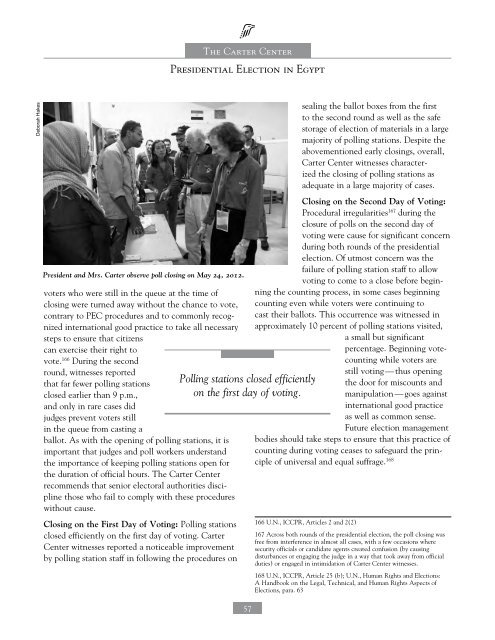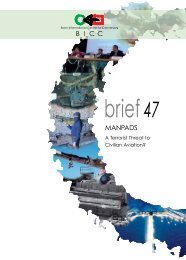egypt-final-presidential-elections-2012
egypt-final-presidential-elections-2012
egypt-final-presidential-elections-2012
Create successful ePaper yourself
Turn your PDF publications into a flip-book with our unique Google optimized e-Paper software.
The Carter Center<br />
Presidential Election in Egypt<br />
Deborah Hakes<br />
President and Mrs. Carter observe poll closing on May 24, <strong>2012</strong>.<br />
voters who were still in the queue at the time of<br />
closing were turned away without the chance to vote,<br />
contrary to PEC procedures and to commonly recognized<br />
international good practice to take all necessary<br />
steps to ensure that citizens<br />
can exercise their right to<br />
vote. 166 During the second<br />
round, witnesses reported<br />
that far fewer polling stations<br />
closed earlier than 9 p.m.,<br />
and only in rare cases did<br />
judges prevent voters still<br />
in the queue from casting a<br />
ballot. As with the opening of polling stations, it is<br />
important that judges and poll workers understand<br />
the importance of keeping polling stations open for<br />
the duration of official hours. The Carter Center<br />
recommends that senior electoral authorities discipline<br />
those who fail to comply with these procedures<br />
without cause.<br />
Closing on the First Day of Voting: Polling stations<br />
closed efficiently on the first day of voting. Carter<br />
Center witnesses reported a noticeable improvement<br />
by polling station staff in following the procedures on<br />
Polling stations closed efficiently<br />
on the first day of voting.<br />
sealing the ballot boxes from the first<br />
to the second round as well as the safe<br />
storage of election of materials in a large<br />
majority of polling stations. Despite the<br />
abovementioned early closings, overall,<br />
Carter Center witnesses characterized<br />
the closing of polling stations as<br />
adequate in a large majority of cases.<br />
Closing on the Second Day of Voting:<br />
Procedural irregularities 167 during the<br />
closure of polls on the second day of<br />
voting were cause for significant concern<br />
during both rounds of the <strong>presidential</strong><br />
election. Of utmost concern was the<br />
failure of polling station staff to allow<br />
voting to come to a close before beginning<br />
the counting process, in some cases beginning<br />
counting even while voters were continuing to<br />
cast their ballots. This occurrence was witnessed in<br />
approximately 10 percent of polling stations visited,<br />
a small but significant<br />
percentage. Beginning votecounting<br />
while voters are<br />
still voting — thus opening<br />
the door for miscounts and<br />
manipulation — goes against<br />
international good practice<br />
as well as common sense.<br />
Future election management<br />
bodies should take steps to ensure that this practice of<br />
counting during voting ceases to safeguard the principle<br />
of universal and equal suffrage. 168<br />
166 U.N., ICCPR, Articles 2 and 2(2)<br />
167 Across both rounds of the <strong>presidential</strong> election, the poll closing was<br />
free from interference in almost all cases, with a few occasions where<br />
security officials or candidate agents created confusion (by causing<br />
disturbances or engaging the judge in a way that took away from official<br />
duties) or engaged in intimidation of Carter Center witnesses.<br />
168 U.N., ICCPR, Article 25 (b); U.N., Human Rights and Elections:<br />
A Handbook on the Legal, Technical, and Human Rights Aspects of<br />
Elections, para. 63<br />
57



